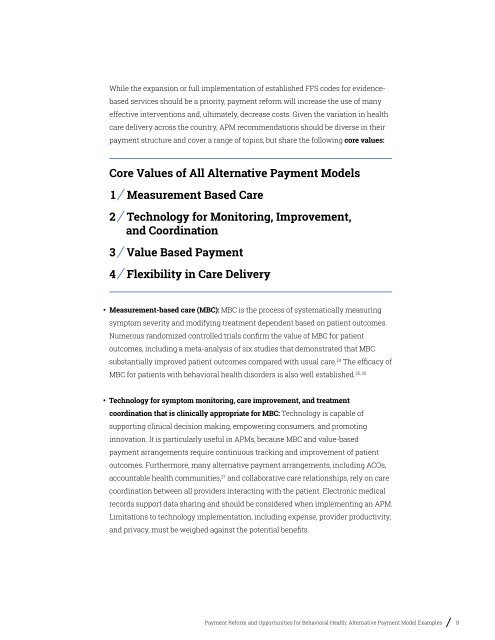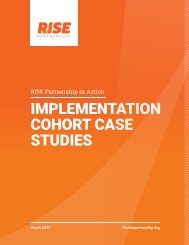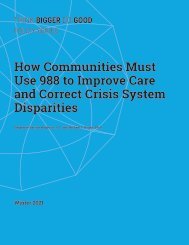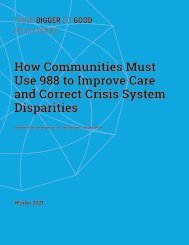Alternative Payment Models
Create successful ePaper yourself
Turn your PDF publications into a flip-book with our unique Google optimized e-Paper software.
While the expansion or full implementation of established FFS codes for evidencebased<br />
services should be a priority, payment reform will increase the use of many<br />
effective interventions and, ultimately, decrease costs. Given the variation in health<br />
care delivery across the country, APM recommendations should be diverse in their<br />
payment structure and cover a range of topics, but share the following core values:<br />
Core Values of All <strong>Alternative</strong> <strong>Payment</strong> <strong>Models</strong><br />
1 Measurement Based Care<br />
2 Technology for Monitoring, Improvement,<br />
and Coordination<br />
3 Value Based <strong>Payment</strong><br />
4 Flexibility in Care Delivery<br />
• Measurement-based care (MBC): MBC is the process of systematically measuring<br />
symptom severity and modifying treatment dependent based on patient outcomes.<br />
Numerous randomized controlled trials confirm the value of MBC for patient<br />
outcomes, including a meta-analysis of six studies that demonstrated that MBC<br />
substantially improved patient outcomes compared with usual care. 24 The efficacy of<br />
25, 26<br />
MBC for patients with behavioral health disorders is also well established.<br />
• Technology for symptom monitoring, care improvement, and treatment<br />
coordination that is clinically appropriate for MBC: Technology is capable of<br />
supporting clinical decision making, empowering consumers, and promoting<br />
innovation. It is particularly useful in APMs, because MBC and value-based<br />
payment arrangements require continuous tracking and improvement of patient<br />
outcomes. Furthermore, many alternative payment arrangements, including ACOs,<br />
accountable health communities, 27 and collaborative care relationships, rely on care<br />
coordination between all providers interacting with the patient. Electronic medical<br />
records support data sharing and should be considered when implementing an APM.<br />
Limitations to technology implementation, including expense, provider productivity,<br />
and privacy, must be weighed against the potential benefits.<br />
<strong>Payment</strong> Reform and Opportunities for Behavioral Health: <strong>Alternative</strong> <strong>Payment</strong> Model Examples 8

















